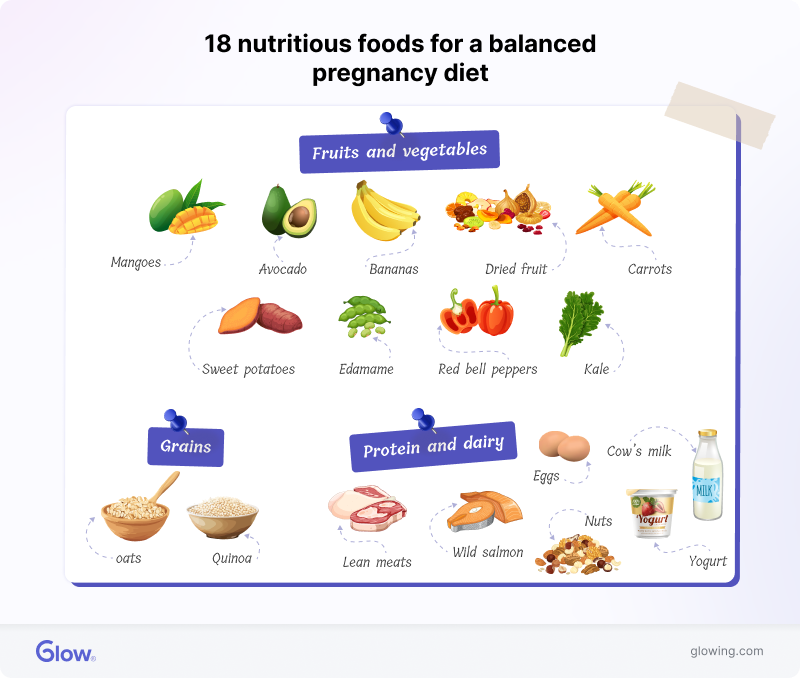What to Eat During Pregnancy: 18 Foods to Include in Your Diet
As the saying goes, “You are what you eat.” Never is this truer than when you’re pregnant. Now that you’re eating for two, you need to be more mindful about your diet than ever.

When you’re pregnant, it’s not just about eating more but also eating smart. You’re fueling both your body and the growing baby inside you, who needs all the nutrition she can get.
Read on to learn about what a healthy diet during pregnancy looks like, including the essential nutrients you should prioritize, how much water you should drink, and 18 foods to add to your diet.
What are the key nutrients to prioritize when you’re pregnant?
While all nutrients are essential, some play a particularly vital role during pregnancy. Here are nutrients you should get more of when you’re pregnant: 1
- Folic acid: This is a B vitamin that’s crucial for preventing neural tube defects (i.e., birth defects of the brain and spine). You need 600 micrograms per day during pregnancy. You may need to take supplements to achieve that amount.
- Iron: Your blood volume increases during pregnancy. You need enough iron to carry oxygen to your baby to support her growth and brain development. Aim for 27 milligrams daily.
- Calcium: Getting enough calcium helps your baby build strong bones and teeth. You’ll also be less likely to have preeclampsia, which can cause dangerously high blood pressure. Get 1,000 milligrams (mg) per day if you’re an adult and 1,300 mg per day if you’re a teenager.
- Vitamin D: Like calcium, Vitamin D also builds strong bones and teeth in your baby. In addition, it benefits your nerves, muscles, and immune systems. You should get 600 international units (IU) a day, whether you’re pregnant or not. 2
- Choline: Your baby’s spinal cord, brain, and nerves will benefit from your choline intake. Experts suggest getting around 450 milligrams of choline each day. 3
Other important nutrients during pregnancy
The list above hits many of the main nutrients you need to make sure to get, but it isn’t exhaustive. Here are some other nutrients that you should also pay attention to:
- Vitamin A: This antioxidant benefits your vision, bone growth, reproduction, cell functions, and immune system. You can find it in colorful fruits and vegetables, as well as animal sources (e.g., liver or milk). 4
- Vitamin B12: Take vitamin B12 to help your body form red blood cells and maintain your nervous system. Common food sources for vitamin B12 include fish, meat, poultry, eggs, and milk. 5
- Vitamin C: Another type of antioxidant, vitamin C helps your body grow and repair its tissues. Eat your veggies and fruits to get enough vitamin C. 6
- DHA: This is an omega-3 fatty acid that’s crucial for your baby’s brain health and development. 7
- Iodine: This nutrient helps your cells turn food into energy. To get iodine, eat seafood, kelp, dairy products, iodized salt, and plants grown in iodine-rich soil. 8
Getting all these nutrients might sound like a challenge, but you can cover all your bases by taking prenatal vitamins, maintaining a balanced diet, and opting for healthy pregnancy snacks instead of junk when you get the munchies between meals.
Discuss with your doctor what and how many prenatal vitamins you should take, along with any prenatal vitamins side effects you experience (like nausea). Don’t exceed the recommended levels, as this can be harmful. For instance, taking too much vitamin A can lead to birth defects. 1
18 nutritious foods for a balanced pregnancy diet
Here comes the delicious part: what foods to eat! Here are 18 pregnancy superfoods to incorporate into your daily diet.
Fruit and vegetables
A healthy diet should include around 2–3 servings of fruit and 5–7 servings of vegetables each day. (Check the nutrition labels on your food for suggestions on serving size.)
Here are some especially nutritious fruits and vegetables to add to your plate: 9
- Mangoes: These are packed with vitamins A and C. As a bonus, they’re also delicious.
- Bananas: Bananas are rich in potassium and can help regulate blood pressure and reduce bloating during pregnancy. They also contain vitamin B6, which may help with morning sickness. 10
- Dried fruit: Eat dried fruits for fiber, iron, potassium, and antioxidants. These are better than candy if you have a sweet tooth, but be mindful of your portion sizes, as they’re still more sugar-dense and caloric than fresh fruits. 11
- Avocado: This is a great source of folate, vitamin B6, and healthy monounsaturated fats. 12
- Lentils: Lentils are a vegetarian powerhouse of protein, iron, and folate, which prevents neural tube defects. They’re also rich in fiber that supports your digestion.
- Edamame: These contain plenty of plant-based protein, calcium, iron, and folate. (But don’t eat the shells—they won’t hurt you, but they’re tough and not meant to be consumed.)
- Carrots: These are packed with beta-carotene, which your body will turn into vitamin A. They’re essential for your baby’s eyes, skin, and organs.
- Red bell peppers: Eat your red bell peppers to get vitamin C, vitamin A, and fiber all at once.
- Kale: This leafy green offers folate, iron, vitamin C, and calcium.
- Sweet potatoes: Eat sweet potatoes to get vitamins A and C, iron, potassium, and fiber.
How you prepare your veggies and fruit is nearly as important as which ones to eat. Avoid frying and preparing vegetables in butter or cream; instead, try eating them raw, steamed, or cooked in healthy oils. Choose fresh fruit instead of canned ones stored in syrup. 9
Grains
For grains, aim for 6–7 ounces per day. 9 Here are two popular ingredients to boost your grain intake:
- Oats: A good source of fiber, oats keep you full and combat constipation during pregnancy. They also contain magnesium, which supports bone and teeth development.
- Quinoa: This whole grain (which is actually a seed) is a complete protein that contains all nine essential amino acids. It’s also packed with other nutrients, such as fiber and iron.
Opt for brown rice, oatmeal, and whole grain foods (e.g., whole grain bread, pasta, and crackers) over their counterparts with low nutritional value, such as fried rice, sugared cereal, white bread, biscuits, and donuts. 9
Protein and dairy
You should get 5–7 ounces of protein and three servings of dairy per day. 9 Check out these protein and dairy products you can add to your menu:
- Lean meats: Lean beef, pork, and poultry are packed with protein and iron, which, as we’ve seen, is crucial for your blood volume and your baby’s development.
- Wild salmon: Wild salmon is great for your baby’s brain and eye development. 13 In addition to omega-3, it also contains iodine and vitamin D.
- Oysters: You can safely eat oysters when you’re pregnant if you cook them until the shells open. As well as being full of protein, they’re also a great source of omega-3, iron, and zinc.
- Nuts: You can get healthy fats, fiber, and several vitamins and minerals like magnesium, zinc, potassium, and vitamin E from nuts. Walnuts provide omega-3s, almonds offer calcium, and peanuts contain lots of folate. 14
- Yogurt: The probiotics in yogurt are your digestion’s friend. Yogurt is also an excellent calcium, protein, iodine, and folate source, and is the basis for dozens of healthy pregnancy-friendly breakfasts. Avoid yogurt with excess sugar or artificial sweeteners. However, honey is safe to eat when you’re pregnant, so you can add a little to your yogurt if you need it.
- Eggs: Although these have seen a few infamous price spikes lately, eggs are usually an inexpensive and accessible source of protein, choline, and vitamin D. They’re good for bone health and brain development.
- Pasteurized cow’s milk: As long as you can tolerate lactose, drinking milk is a great way of getting calcium, vitamin D, iodine, and protein. If you aren’t a fan of drinking straight milk, you can use it to make smoothies or popsicles. Be sure to opt for pasteurized milk—never raw milk.
- Pasteurized cheeses: As with other dairy products, you can still eat many kinds of cheese while pregnant if they’re made from pasteurized milk. Hard cheeses like Parmesan and cheddar are the safest options.
When cooking, use unsaturated oils, such as olive, canola, or peanut oil. Stay away from coconut oil, palm or palm kernel oil, lard, butter, and stick margarine. 9
Water
Water isn’t a food, but staying hydrated is just as important as eating nutritious foods, particularly when you’re pregnant. Dehydration can increase the risk of conditions such as: 15
- Constipation
- Hemorrhoids
- Excessive swelling
- Urinary tract or bladder infections
- Early labor
You’ll need more fluids than usual to keep your baby hydrated as well as yourself. Drink water regularly throughout the day instead of waiting until you’re thirsty. A good rule of thumb is to drink around 9 cups of water each day. 9
You may need to drink even more water if your activity levels are higher, the weather is hotter, or you’re feverish, vomiting, or have diarrhea. Signs that show you’re drinking enough water include your urine looking pale yellow or colorless and rarely feeling thirsty. 15

What should vegetarians and vegans eat during pregnancy?
For all the vegetarian and vegan moms out there, pay extra attention to maintaining a well-balanced diet so that you get all the necessary nutrients for your baby. It’s perfectly possible to get everything you need from plant-based sources, but it takes more work.
In particular, make sure you’re getting enough protein, which people often mainly get from animal products. Here are some non-meat foods that are rich in protein: 16
- Dried beans
- Soy products (e.g., tofu and soy milk)
- Lentils
- Nuts and nut butter
- Whole grains
- Eggs and dairy products (if you eat them)
In addition, vitamin A is important for vegetarians. 4 Talk to your doctor or a registered dietician to create a balanced meal plan and determine what additional supplements you should take.
What foods should you avoid during pregnancy?
Understanding what foods to avoid during pregnancy and why you need to avoid them is also a big deal. Here are some foods and drinks that can pose risks to you and your baby: 9 1
- Unpasteurized juices, cheeses, and milk: Unpasteurized items can harbor harmful bacteria like Listeria monocytogenes, which can lead to miscarriage, health problems for your newborn, and—in extreme cases—even infant death. 17
- Refrigerated hot dogs, deli meats, and luncheon meats: These foods can also contain listeria. However, they’re not off-limits completely; pregnant women can eat hot dogs, pepperoni, and similar foods if they’re heated to 165ºF first. You should also watch out for any symptoms of listeria while you’re pregnant (like fever, fatigue, and muscle aches). 18
- Raw or undercooked meats and seafood: Raw or undercooked meat and fish are big no-nos during pregnancy. Sorry, sashimi lovers; you can’t eat sushi made with raw fish when you’re pregnant. Ensure all meat and seafood are cooked thoroughly to prevent bacterial or viral contamination.
- Raw or undercooked eggs: Raw eggs can carry Salmonella, a bacteria that’s linked to food poisoning. 19 Cook eggs until both the white and yolk are firm, and avoid foods containing raw eggs, such as homemade mayonnaise.
- High-mercury fish: Don’t eat fish that are high in mercury, such as tilefish, shark, orange roughy, swordfish, king mackerel, marlin, and most types of tuna (though generally, pregnant women can eat canned light tuna). Mercury can harm the development of your baby’s brain and nervous system. 20
- Raw sprouts: While sprouts are healthy, eating them raw can lead to food poisoning because they may have harmful bacteria like E. coli or Salmonella.
- Herbal teas: Some herbal drinks may harm your baby. Avoid drinking herbal teas unless you get the green light from your doctor. 21
- Excessive caffeine: While you can drink coffee when you’re pregnant, too much caffeine can be harmful to your baby. Discuss how much you can have with your doctor; one common recommendation is to drink no more than 200 mg per day, which translates to around 12 ounces of coffee.
- Alcohol: You should avoid wine and other alcohol altogether during pregnancy. That’s because it can lead to fetal alcohol spectrum disorders (FASDs), which can cause serious developmental issues in your baby. 22
How much weight is it normal to gain in pregnancy?
Exactly how much weight you should gain depends on your body type. Here’s a guide on the ideal amount of weight you should gain according to your pre-pregnancy body mass index (BMI): 9
- Underweight (BMI less than 18.5): Aim for 28–40 pounds.
- Normal (BMI 18.5–24.9): 25–35 pounds.
- Overweight (BMI 25–29.9): 15–25 pounds.
- Obese (BMI 30 or more): 11–20 pounds.
Keep in mind that these are just rough estimates. Talk to your doctor for a more tailored recommendation. As you can imagine, you’ll typically have to gain more weight if you’re carrying multiples instead of just one baby.
Final thoughts
Maintaining a healthy diet throughout your pregnancy is one of the best gifts you can give yourself and your baby. Focus on nutrient-dense foods, take any necessary supplements, stay hydrated, and avoid potentially harmful substances like mercury-rich fish and alcohol.
If all of this seems like a pain, try to look at it from a different perspective. Eating healthy doesn’t have to be a burden; you can have lots of fun creating a tailored menu for your pregnancy. Look up recipes online to make your meals enjoyable—happy eating!
Article Sources
- MedlinePlus. "Pregnancy and Nutrition" Retrieved April 30, 2025.
- MedlinePlus. "Vitamin D" Retrieved April 30, 2025.
- South Dakota WIC. "Choline: Why it is Important for Moms and Kids" Retrieved April 30, 2025.
- MedlinePlus. "Vitamin A" Retrieved April 30, 2025.
- MedlinePlus. "Vitamin B12" Retrieved April 30, 2025.
- MedlinePlus. "Vitamin C" Retrieved April 30, 2025.
- Agricultural Research Service. "OMG- OMeGa-3s!" Retrieved April 30, 2025.
- MedlinePlus. "Iodine in diet" Retrieved April 30, 2025.
- U.S. Department of Veterans Affairs. "Prenatal Nutrition Goals" Retrieved April 30, 2025.
- MedlinePlus. "Morning sickness" Retrieved April 30, 2025.
- Harvard Health Publishing. "Dried fruit: Healthy snack, sugary treat, or somewhere in between?" Retrieved April 30, 2025.
- UnityPoint Health. "18 Foods Filled with Folate Every Woman Should Know" Retrieved April 30, 2025.
- United States Environmental Protection Agency. "Health & Environmental Research Online (HERO)" Retrieved April 30, 2025.
- Johns Hopkins Medicine. "5 Snack Foods to Eat While Pregnant" Retrieved April 30, 2025.
- Office on Women's Health. "Staying healthy and safe" Retrieved April 30, 2025.
- RDN Resources. "Vegetarian Diets in Pregnancy" Retrieved April 30, 2025.
- U.S. Food & Drug Administration. "Listeria (Food Safety for Moms-to-Be)" Retrieved April 30, 2025.
- U.S. Centers for Disease Control and Prevention. "How Listeria Spread: Deli Foods and Prepared Meats" Retrieved April 30, 2025.
- U.S. Food & Drug Administration. "What You Need to Know About Egg Safety" Retrieved April 30, 2025.
- U.S. Centers for Disease Control and Prevention. "Mercury and Breastfeeding" Retrieved April 30, 2025.
- Delaware Health and Social Services - State of Delaware. "Tips for A Healthy Pregnancy" Retrieved April 30, 2025.
- U.S. Centers for Disease Control and Prevention. "About Fetal Alcohol Spectrum Disorders (FASDs)" Retrieved April 30, 2025.







